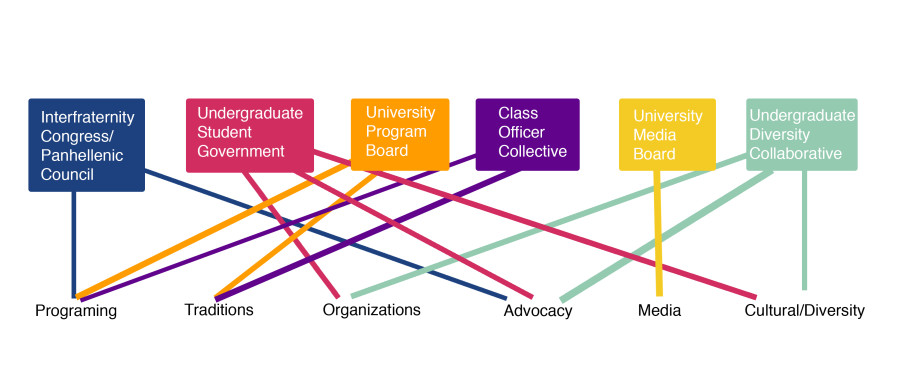Let’s not further complicate student group funding
Proposed pillar component of SEC reform plan would hurt more than help
Each current umbrella group at the SEC level would correspond to the following pillars in the proposed plan. Other than University Media Board, all umbrellas correspond to more than one pillar, making the proposed reform overly complicated.
We drew a diagram (above) displaying the proposed Student Executive Council (SEC) restructure plan. Are you a bit confused by it? Because we were at first.
The SEC Reform Task Force shouldn’t offer the current overly complex proposal to the SEC on March 31. The Editorial Board believes that the reform proposal of the already convoluted student funding structure needs to be simplified.
The current SEC is made up of students from “umbrella” (top of the chart) organizations that nearly all clubs fall under. Clubs apply to their own umbrella organization for funding, and the SEC determines how much each umbrella gets. The SEC’s decisions are key to how anyone gets their money.
The proposal that sits before the SEC seeks to move some allocation decisions to a separate group of “treasurers” elected by the student body. Those that make up the current SEC will then request allocations from these treasurers.
According to the proposal, instead of allocating funds by umbrella group, these “treasurers” will distribute money based on six pillars of organization function (along with some money set aside in a reserve): programming, media, advocacy, cultural/diversity, traditions and organizations.
Most umbrellas’ funding will fall under multiple pillars. While it’s great to look at student funding in regards to function rather than group notoriety, the system adds another step to the already lengthy process of allocating funds. Adding more steps makes the process more complex for clubs and more difficult for the student body at large to understand.
At first glance, the pillars may seem like a great attempt to reduce the unfortunate contention between the current umbrellas during SEC deliberations. These quarrels hurt many organizations finance-wise in the end. We hope the final reform proposal includes provisions to reduce fights as much as possible. A system that allows umbrellas to be friendly translates into better leadership.
We think that the addition of pillars, however, will intensify what are now squabbles into a complete tournament. The current SEC umbrellas thoughtfully make changes to their allocation requests based on each others’. With the addition of pillars, umbrellas will face more difficult decisions.
Not only will they have to concern themselves with the decisions of other umbrellas, but each umbrella’s assigned pillars will also matter. Instead of making a bet on one pot of money, umbrellas will have to vie to do their best in separate pools.
This could not only result in more infighting, but it could also drastically change the allocations of each umbrella each semester. This kind of decision making will stretch leaders thin, making it more difficult to make long term plans. It would mean a lack of continuity between years.
This instability would be worse than the current SEC in every manner because many clubs’ future finances would become unpredictable.
As per the above discussion, the nuances of the reform are crucial to whether it will be progressive or remain symbolic.
Any student who wants to avoid throwing $177 down the drain should be concerned. When the funds have to jump through so many hoops, it’s easy to get lost in the shuffle of decision-making. The proposed reforms only further complicate an already problematic process.
We want SEC reform, just not this pillar component in the plan.
This is the chance for students to strike at the heart of the system by voicing their concerns about how three-quarters of a million dollars for them is allocated. (Ironically, a lack of student or club oversight is the main reason the SEC is considering change.)
All students should attend the March 31 SEC public meeting at 9 p.m. in Thwing Room 302.
At this meeting, the SEC Reform Task Force will present a final reform proposal. Any reform is required to go to a campus-wide vote before actual implementation, but the meeting is the true opportunity for a change.
Every student’s voice matters in deciding how their money will be spent in the future. SEC members are known for taking what other students say at their meetings into consideration.
Students can make suggestions to the task force email SEC-chair@case.edu at any time.
Listen to the proposal at the March 31 public meeting in Thwing 302 at 9 p.m. Then give your response directly to those who decide what happens to it.


